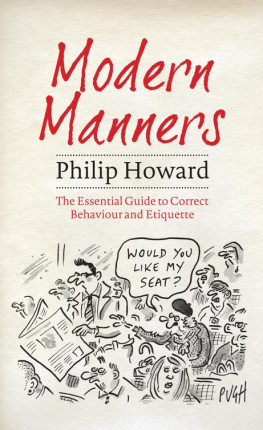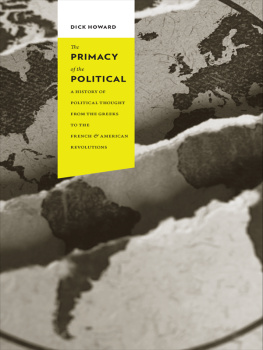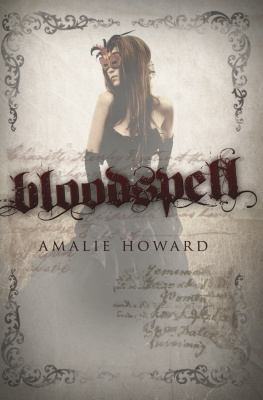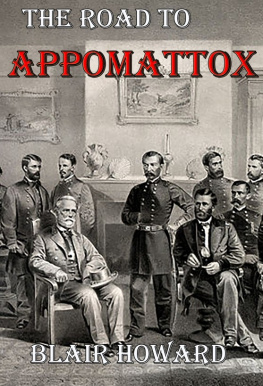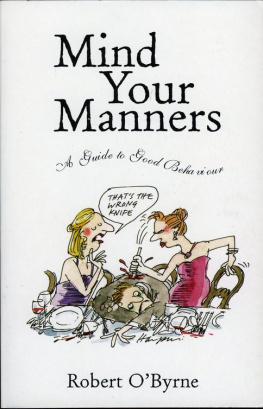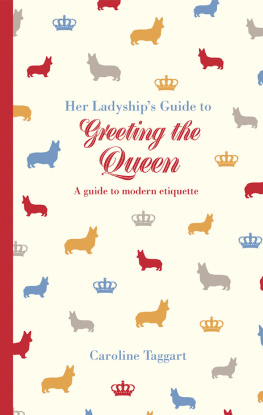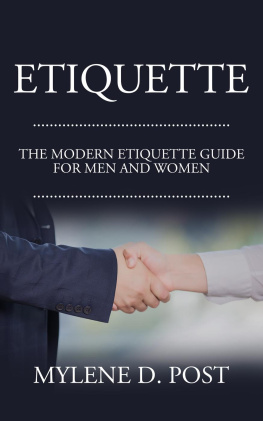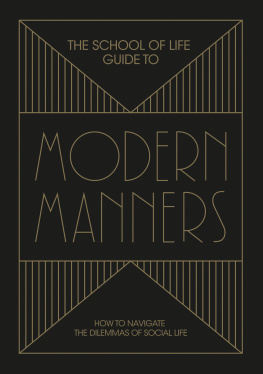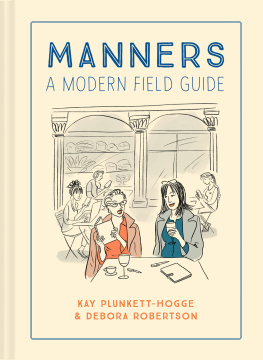M anners Maketh Man. That was the motto of William of Wykeham (13241404), Bishop of Winchester, Chancellor of England and founder of the second best public school. Our first written record is from a manuscript of about 1350: Maner makys man. This has become a proverb. But we have changed his meaning. As far as we can interpret his words, by manners William meant something like the customary code of behaviour. As Hamlet, explaining the drunken revelry in his uncles court, says to Horatio:
But to my mind, though I am native here
And to the manner born, it is a custom
More honoured in the breach than the observance.
When The Times introduced an etiquette column by John Morgan, I raised a priggish eyebrow. He was the fashion editor of the Gentlemens Quarterly, and possessed sixty made-to-measure suits, three hundred monogrammed shirts, ninety pairs of shoes and more opera cloaks and silk hats than even Solomon in all his glory kept in his cupboard. I imagined that Times readers needed no advice on how to dress or behave. I was wrong. Morgans Manners was a raging success. When he died, possibly a suicide (the coroners inquest returned an open verdict), falling from his flat on the top of The Albany (by Piccadilly: the smartest block in town), The Times decided that nobody could treat fashion as seriously as John Morgan, and appointed me to treat manners differently.
Down seven centuries we changed manners to mean good manners, polite behaviour, i.e. etiquette. This French word originally meant a soldiers billet for lodging , from which we take our word ticket or label. The history of the development in French from label to prescribed routine is not clear. But etiquette has come to mean the conventional rules of personal behaviour observed in the intercourse of polite society. Cave! That sentence contains a number of value judgements. Homo sum, humani nil a me alienum puto. (Im a human, so I count nothing human foreign to me.) So said the polite Terence.
I could not possibly share Morgans passion for his subject. I am not notorious for being a snazzy dresser. I own no opera cloak, and have only one pair of shoes/boots, given to me by a member of a touring Australian rugby team. My friends raised eyebrows at the appointment.
I resolved to approach it differently, not taking it as a quasi-religion or a decorative art form, but with a beady eye to the peculiarity and beauty of human behaviour.
I sometimes misspelt etiket in a permissive way, for a joke, to suggest that rules even of spelling, like those of manners, are subjective and transient. It is, of course, not just wrong to spell etiket, but a crime against etymology. You are obscuring the roots of the word. That is why Shavian projects to reform spelling phonetically are misguided, as well as impractical. Whose pronunciation would our spelling copy? Memphis, Manchester, or Mumbai? And we would have to reprint the whole of literature from Beowulf to Auden.
Manners are not a fixed code. Autres temps, autres murs. Stone Age man must have devised the original rude codes of manners about who took first bite of the woolly mammoth, or he would not have survived.
We are at present working out the correct manners for using mobile phones, iPods, iPhones and the other tools of our Age of Information, as well as that tricksy doxy, Miss Information.
Autres lieux, autres murs. In England the Augustan Age, of the Restoration and early eighteenth century, of Dr Johnson and Swift, is considered a time of good manners, though Sam was an untidy eater. And that name refers back to the supposed golden age of the Emperor Augustus, and his poet Horace, who was witty about manners. The Regency, with Beau Brummel, did manners. Let us not confuse manners with mannerism . We look back on the Edinburgh of David Hume and Adam Smith, and the Enlightenment generally in Europe, as a time of good manners.
In France, the fountain of manners, the golden age is considered that of Louis XIV, the Sun King, and le petit snob, the Duc de Saint-Simon, who managed to write vast tomes on the superficially jejune subject of who takes off his hat first to whom, and why. Black Watch officers, and I dare say those from lesser regiments, are ordered always to wear hats when in civvies out of barracks, so that they can return salutes from Jocks, and salute ladies whom they meet.
Some etiquette is fuss and feathers, with no practical use beyond setting parameters for snobbery. The Byzantine princess, Maria Agropoulaino, is credited with introducing the fork to Western European dinner tables. When she married the son of the Doge of Venice in ad 1004, she used a golden double prong to convey food to her mouth. Everybody else used their fingers. Maria was widely criticised by the bishop and the court for bad manners. The etiquette for passing port after dinner, especially in the Royal Navy, is majestically complex. And shame on him who tries to pass it anticlockwise, or is slow to pass on the decanter when he has refilled his own glass.
Some etiquette has mildly utilitarian purpose: for example that the man should walk on the outside of the woman on the pavement, in order to protect her from splashes from hansom cabs and horsemen, or, these days, rogue drivers of double-decker buses. A correspondent contrived a paradox. What is the etiquette, he asked, for a man escorting a woman down a path with a road on one side, and a river on the other? Should he shield her from being splashed by cars or motor boats? There was never a shortage of correspondents, some earnest seekers after advice, others mobbing the subject up.
There is a mildly utilitarian point for a gent opening the door for a lady, except when it is raining, when he leads the way in order to open the umbrella for her. And what is the correct procedure with revolving doors? We devised a Saint-Simon etiquette that the man goes first, but goes round twice, so that he can protect the lady in front and behind, and pick up anything such as an umbrella that the lady has dropped. A Spanish dance troupe were late for their performance, and rushed to the revolving doors to exit from their hotel. They got stuck in the door. Which just shows that you should not put all your Basques in one exit.
And some etiquette matters quite a lot. It is bad manners and shameful not to reply to invitations, or to thank for hospitality or presents. How can your host(ess) seat her dinner table, without knowing if you are coming? How can Great Aunt Fanny know how your writing is improving , if you do not write her a thank you letter? When Sir Philip Sidney was dying on the battlefield of Zutphen in 1586, he gave his water-bottle to a dying soldier, saying: Thy necessity is yet greater than mine. That was the pinnacle of good manners as well as Christian behaviour.
The golden rule of all good manners the only one that really matters is to cause least pain to other people. Do unto others as you would be done by. Behave yourself, like a decent lady or gent.
Is it considered bad etiquette to laugh at ones own jokes?
Marcus S., Brighton
Depends on the joke and the company. Extroverts laugh. Introverts deadpan, which is probably more effective, especially if nobody else is laughing. The overriding principle is not to offend the sensitive by immoderate cachinnation at an inappropriate joke. The best wit is dry and quiet the stiletto rather than the blunderbuss.

